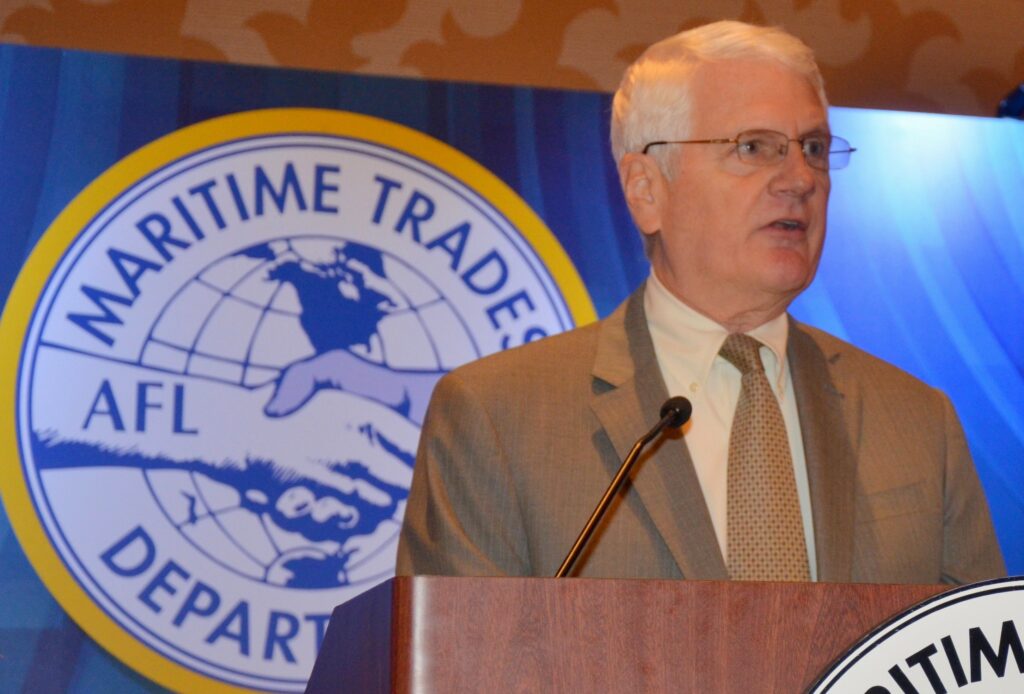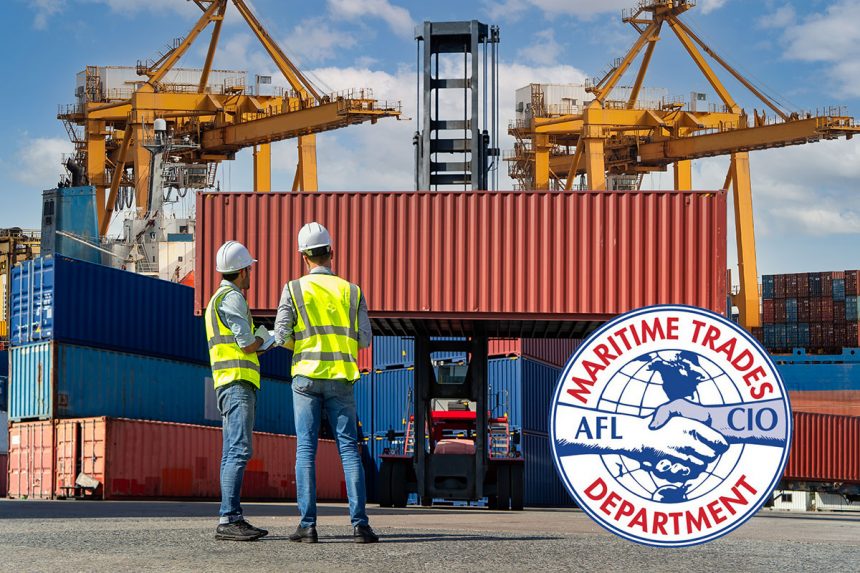
Likening the decades-long fight to a boxing match, a guest speaker at the Maritime Trades Department, AFL-CIO Executive Board meeting said the U.S. maritime industry continues winning rounds but is still looking for a knockout punch when it comes to excluding maritime from trade agreements.
Donald O’Hare, a trade consultant who formerly served as a Sea-Land executive and a vice president of the World Shipping Council, said in his February 18 remarks that trade negotiations “can be really boring, as long as the negotiators’ target is on someone else’s back. But when you notice that there is suddenly a target on your back, things change.”
O’Hare spoke from experience. He has served as an industry advisor to U.S. government delegations to the United Nations Conference on Trade and Development, the UN Commission on International Trade Law, the World Trade Organization and numerous other bilateral negotiations.
He provided a detailed history of how the maritime industry “became entangled in the trade process in the first place” before addressing current negotiations. O’Hare credited the efforts of MTD President Michael Sacco and Seafarers Secretary-Treasurer David Heindel (who also serves as the chair of the London-based International Transport Workers’ Federation seafaring section and on the U.S. Labor Secretary’s Trade Advisory Committee) for helping secure a number of wins for American-flag shipping and U.S. crews throughout the years.
O’Hare offered some history on a Geneva-based organization called the General Agreement on Tariffs and Trade (GATT, the name of both the body and its related pacts), formed after World War II. The U.S. maritime industry stayed out of GATT until the mid-1980s.
“Long story short, at 3 a.m. on the last night of the 11-year negotiation, a last-minute proposed trade-off between U.S. maritime services and European Union movie quotas was considered,” O’Hare recalled. “You heard correctly: An agreement to bring both U.S. maritime services and the European film industry into the GATT liberalization process. An unlikely deal that almost came about. A series of last-second, very high-level U.S government phone calls put an end to it. We can thank President Sacco for putting that process in motion that night. But it showed us how precarious the trade process can be. So we won round one – but not by knockout.”
He continued, “More recently, we dealt with the so called Doha Round of the World Trade Organization trade talks. Since its start in 2001, thanks to the efforts of the United States Maritime Coalition and the American Maritime Partnership, continuing pressure by Congress and the Maritime Administration and a better understanding of the importance of our industry by the U.S. trade representative, foreign efforts to drag maritime services back into the trade process have been unsuccessful. We won round two of our trade fight, but still no knockout.”
Turning to other battles, O’Hare discussed the Trans Pacific Partnership (TPP, which is more than 5,500 pages), the Transatlantic Trade and Investment Partnership (TTIP), and the Trade in Services Agreement (TISA).
The TTIP is “of more immediate concern,” he stated. “It is a bilateral negotiation between the United States and the European Union with multiple chapters…. There is considerable pressure from the European side to include maritime transport services which, as of now, has been resisted by the U.S. side. However, European shipowners and shipyards see this as an opportunity to make inroads into some U.S. domestic shipping markets. Their three specific targets are feeder services, dredging and the use of European-built vessels in certain domestic services such as offshore supply and the potential offshore wind energy market.”
However, strong U.S. efforts both at home and abroad to protect American-flag ships and U.S. mariners are ongoing. O’Hare quoted from a U.S. Maritime Coalition letter that summarized the industry’s collective position: “The industry – carriers, shipyards and seafarers – has a simple message: It strongly opposes the inclusion of maritime matters in trade agreements because it is detrimental to the United States’ national defense and economic interest. Recognizing the negative impact to the United States, the USTR and every administration worked to ensure maritime matters were not included in the General Agreement on Tariffs and Trade, the General Agreement on Trade in Services (GATS), or any regional or bilateral trade agreements. Our laws and regulations are clear and transparent. Our international trades are liberalized, as evidenced by the fact that roughly 97 percent of international trade with the United States occurs on foreign-flag vessels. We do not believe it is desirable, appropriate, or necessary to include maritime matters in the TTIP or any other trade agreement context.”
O’Hare said the U.S. maritime industry has been heard “loud and clear. I know the MTD and its affiliates, under the leadership of President Sacco and (Executive Secretary-Treasurer) Dan Duncan – along with the carriers, shipyards and others in the coalition will continue to provide a unified voice in defense of our industry.
“This ongoing maritime trade fight may finally be over this year or more likely next,” he concluded. “And hopefully this time by knockout.”

